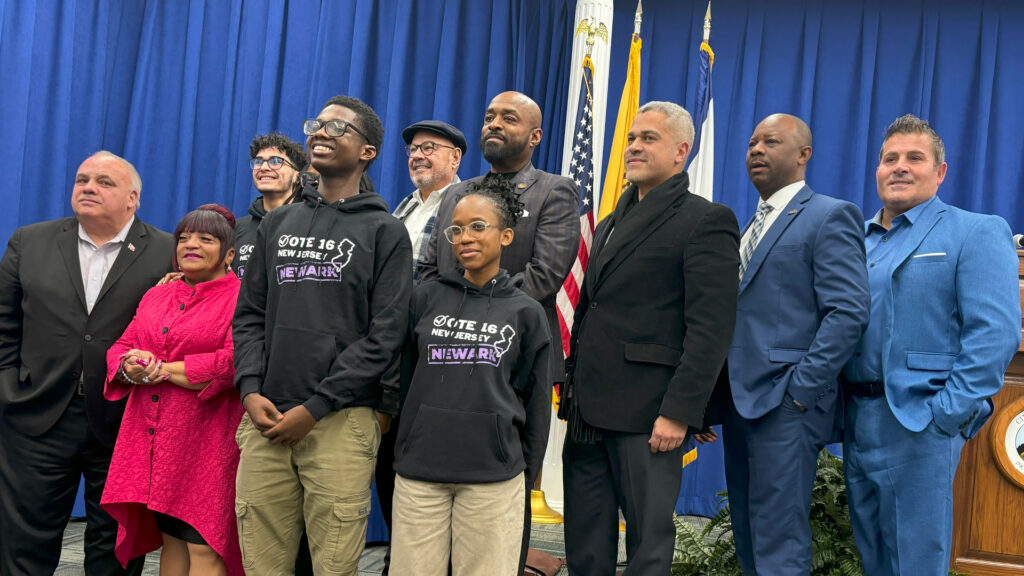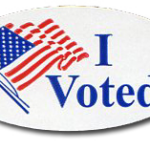
New Jersey’s largest city is lowering the voting age to 16 in school board elections, and young people across the state are hoping to extend the initiative statewide.
While Newark’s school board elections in April will be the first time anyone under 18 can vote in New Jersey, 16- and 17-year-olds are able to vote in local elections in about a dozen U.S. cities and in all elections in some other countries. Their stories can provide a glimpse of what a lower voting age might mean for New Jersey’s elections.
The New Jersey Institute for Social Justice estimates that more than 7.000 Newark teenagers will be eligible to vote for the first time in April; roughly 4,600 people voted in the city’s most recent school board election.
“The biggest lesson is probably it does not harm. Therefore, you can lower the voting age and there are no negative consequences that quite some people thought might arise,” said Sylvia Kritzinger, a professor at Universität Wien in Vienna, who studies elections and voting behavior in Austria.
Austria lowered the voting age in all elections from 18 to 16 in 2007, and almost two decades later, Kritzinger said there is widespread agreement that it was the right move.
“The fears that were there in the beginning completely vanished,” Kritzinger said.
Estonia and Malta also lowered the voting age to 16 for all elections, and Scotland and Wales also lowered the age limit to 16 for local and parliamentary elections. In the United States, a dozen municipalities have lowered the voting age, including eight in Maryland that let 16- and 17-year-olds vote in all municipal elections. In California, Berkeley and Oakland approved a lower voting age for school board elections only.
Jan Eichhorn, a senior lecturer and researcher at the University of Edinburgh, said while New Jersey’s political system is different from the other systems that have made the change, some findings have been consistent across boundaries. The most common finding, he said, is that nothing bad happens.
Higher turnout
In places where the age limit was lowered effectively, 16- and 17-year-old voters turn out at greater rates than 18-20-year-old first-time voters, Eichhorn said, and in some parts of Latin America and Europe there is evidence of a lasting effect into early adulthood.
This is because first-time voter experiences are more likely to be positive if they happen in a stable environment, such as while living at home with family and attending school with classmates who are also first-time voters, he said. At 18, voters are in a more transitional phase of life which can make it difficult to learn a habit.
“Eighteen is probably the worst voting age that you could have because at the age of 18, there is so much other stuff going on — moving out, going to college, starting to work, having a family, having new friends, whatever,” Kritzinger said.
In Takoma Park, Maryland, the first U.S. city to lower the voting age in 2013, turnout among 16- and 17-year-olds was nearly four times the rate of registered voters who are 18 and older, according to LaJuan Allen, director of Vote16USA.
Mike Hanmer, director of the University of Maryland’s Center for Democracy and Civic Engagement, called Takoma Park a “success story,” noting that turnout for 16- and 17-year-olds is consistently higher than for 18-30-year-olds and people over 30.
“There was a real demand from young people for this and so guess what? They showed up,” said Hanmer, who is part of the Vote16 Research Network, which brings together researchers, advocates and elected officials to study what happens when the voting age is lowered.
New Jersey school board elections typically have low turnout. In Newark’s 2024 school board election, less than 3% of registered voters participated.
Young people are ready
Research from other places that allow 16-year-olds to vote has shown that young people are informed and know which party best represents their political preferences, Kritzinger said.
“This is a slightly wrong notion that all young people are voting for leftist parties. But actually, we see that they are nicely distributed along the ideological polls,” she said.
Eichhorn noted that young people care about all the same issues as other voters — the economy, jobs, education and migration — even if they may approach them from a different perspective.
Arguments about a lack of factual knowledge at 16 and 17 break down quickly because most countries do not take away voting rights from people in old age who lose cognitive abilities or people who can’t name the president, he added.
Still, introducing good civic education while lowering the voting age can help enhance the positive effects of both, Eichhorn said. Deliberative civic education that allows people to discuss the issues and have a considerate debate with people who have different opinions is the best path, he noted.
Strong civic education could be easier to implement in Newark than the other U.S. towns that have lowered the voting age because of the potential to work with the school district on voter registration and engagement efforts, Hanmer said.
Maryland has countywide school districts, so the 16- and 17-year-olds who live in towns with a lower voting age attend school with classmates who aren’t allowed to vote yet. This makes it harder to generate programs to support the young voters, Hanmer said.
“It’s not just about flipping a switch and bringing more people into the electorate. You really have to work at it and make sure you get the voter education piece, the implementation piece,” he said.
What sets New Jersey apart?
New Jersey’s election system has some characteristics that make it harder to implement a lower voting age. People can first register to vote at 17 in New Jersey, rather than at 16 as in Maryland. This means election officials would need to make changes to the registration process rather than just pulling from existing registrations if the age limit were lowered statewide.
Eichhorn said instituting automatic voter registration is the best option, but election officials can also create opportunities to register at schools, sports games and clubs to reach people.
Newark will be the second-largest U.S. city to implement votes at 16, and Allen of Vote16USA said the state is leading the way on implementation by working quickly to expand voting rights. Newark City Council voted to lower the voting age in January 2024 and 16- and 17-year-olds are on track to participate in their first election in April 2025. Oakland, the largest U.S. city to lower the voting age, did so in 2020 but 16-year-olds will be voting for the first time this November.
There are some challenges to implementing a lower-voting age just for school board elections — as Gov. Phil Murphy supports — rather than all municipal elections, Hanmer said. In April elections, the school board is generally the only election on the ballot. But if school elections are on the ballot in November elections, 16- and 17-year-olds won’t be able to vote in every election held that day, including for mayor, Congress or president.
Even though 16- and 17-year-olds can’t vote in every race, the process should be welcoming and inclusive, Hanmer said. This means the youngest voters shouldn’t be directed to a separate room from other voters, he said.
It can be frustrating for people to be allowed to vote in one type of election and not another, but voter education can help avoid confusion, Hanmer said.
Vote16USA’s goal is full enfranchisement for 16- and 17-year-olds in all U.S. elections.
“Lowering the voting age is the next big thing in our democracy. This is a movement that is strong and vibrant up and down the country, in every corner of the country,” Allen said.



